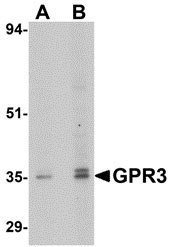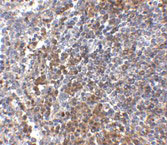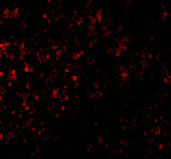GPR3 Antibody
- 产品详情
- 实验流程
- 背景知识
Application
| WB, IF, E, IHC-P |
|---|---|
| Primary Accession | P46089 |
| Other Accession | P46089, 1170006 |
| Reactivity | Human, Mouse, Rat |
| Host | Rabbit |
| Clonality | Polyclonal |
| Isotype | IgG |
| Calculated MW | 35010 Da |
| Concentration (mg/ml) | 1 mg/mL |
| Conjugate | Unconjugated |
| Application Notes | GPR3 antibody can be used for detection of GPR3 by Western blot at 1 - 2 µg/mL. Antibody can also be used for immunohistochemistry starting at 2.5 µg/mL. For immunofluorescence start at 20 µg/mL. |
| Gene ID | 2827 |
|---|---|
| Other Names | G-protein coupled receptor 3, ACCA orphan receptor, GPR3, ACCA |
| Target/Specificity | GPR3; |
| Reconstitution & Storage | GPR3 antibody can be stored at 4℃ for three months and -20℃, stable for up to one year. As with all antibodies care should be taken to avoid repeated freeze thaw cycles. Antibodies should not be exposed to prolonged high temperatures. |
| Precautions | GPR3 Antibody is for research use only and not for use in diagnostic or therapeutic procedures. |
| Name | GPR3 |
|---|---|
| Synonyms | ACCA |
| Function | Constitutively active G-protein coupled receptor that maintains high 3'-5'-cyclic adenosine monophosphate (cAMP) levels that a plays a role in serveral processes including meiotic arrest in oocytes or neuronal development via activation of numerous intracellular signaling pathways. Acts as an essential activator of thermogenic adipocytes and drives thermogenesis via its intrinsic G(s)- coupling activity without the requirement of a ligand (PubMed:34048700). Has a potential role in modulating a number of brain functions, including behavioral responses to stress (By similarity), amyloid-beta peptide generation in neurons (By similarity). Stimulates neurite outgrowth in cerebellar granular neurons modulated via PKA, ERK, and most strongly PI3K-mediated signaling pathways (By similarity). |
| Cellular Location | Cell membrane; Multi-pass membrane protein. |
| Tissue Location | Expressed predominantly in the central nervous system, and at low levels in the lung, kidney, testis, ovary and eye Highly expressed in regions of the brain implicated in the Alzheimer disease |
For Research Use Only. Not For Use In Diagnostic Procedures.
Provided below are standard protocols that you may find useful for product applications.
BACKGROUND
GPR3 Antibody: GPR3, also known as ACCA, is a G-protein coupled receptor that constitutively activates adenylate cyclase and is highly expressed in the central nervous system. Overexpression of GPR3 stimulates the production of amyloid-beta peptide (Abeta), the deposition of which is one of the pathological hallmarks of Alzheimer 's disease (AD), while the ablation of GPR3 prevented the accumulation of Abeta in vitro and in an AD mouse model. This is of particular interest because of the proximity of a reported candidate Alzheimer 's disease (AD) locus, suggesting that GPR3 may be a potential therapeutic target for the treatment of AD. GPR3 has also been shown to block the proliferation of cerebellar granule cell precursors (GCP) during postnatal development by inhibiting the Shh-induced proliferation of GCP, indicating that GPR3 activation may represent one of the signals that triggers the postnatal cell cycle exit and terminal differentiation of GPCs.
REFERENCES
Marchesse A, Docherty JM, Nguyen T, et al. Cloning of human genes encoding novel G protein-coupled receptors. Genomics1994; 23:609-18.
Eggerickx D, Denef JF, Labbe O, et al. Molecular cloning of an orphan G-protein-coupled receptor that constitutively activates adenylate cyclase. Biochem. J.1995; 309:837-43.
Thathiah A, Spittaels K, Hoffmann M, et al. The orphan G protein-coupled receptor 3 modulates amyloid-beta peptide generation in neurons. Science2009; 323:946-951.
Blacker D, Bertram L, Saunder AJ, et al. Results of a high-resolution genome screen of 437 Alzheimer’s disease families. Hum. Mol. Genet.2003; 12:23-32.
终于等到您。ABCEPTA(百远生物)抗体产品。
点击下方“我要评价 ”按钮提交您的反馈信息,您的反馈和评价是我们最宝贵的财富之一,
我们将在1-3个工作日内处理您的反馈信息。
如有疑问,联系:0512-88856768 tech-china@abcepta.com.























 癌症的基本特征包括细胞增殖、血管生成、迁移、凋亡逃避机制和细胞永生等。找到癌症发生过程中这些通路的关键标记物和对应的抗体用于检测至关重要。
癌症的基本特征包括细胞增殖、血管生成、迁移、凋亡逃避机制和细胞永生等。找到癌症发生过程中这些通路的关键标记物和对应的抗体用于检测至关重要。 为您推荐一个泛素化位点预测神器——泛素化分析工具,可以为您的蛋白的泛素化位点作出预测和评分。
为您推荐一个泛素化位点预测神器——泛素化分析工具,可以为您的蛋白的泛素化位点作出预测和评分。 细胞自噬受体图形绘图工具为你的蛋白的细胞受体结合位点作出预测和评分,识别结合到自噬通路中的蛋白是非常重要的,便于让我们理解自噬在正常生理、病理过程中的作用,如发育、细胞分化、神经退化性疾病、压力条件下、感染和癌症。
细胞自噬受体图形绘图工具为你的蛋白的细胞受体结合位点作出预测和评分,识别结合到自噬通路中的蛋白是非常重要的,便于让我们理解自噬在正常生理、病理过程中的作用,如发育、细胞分化、神经退化性疾病、压力条件下、感染和癌症。








